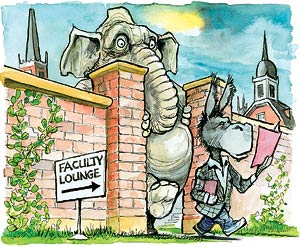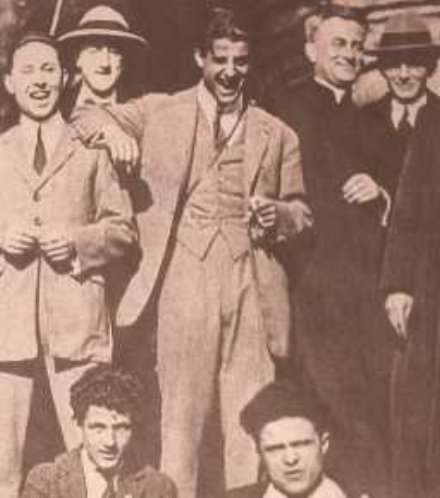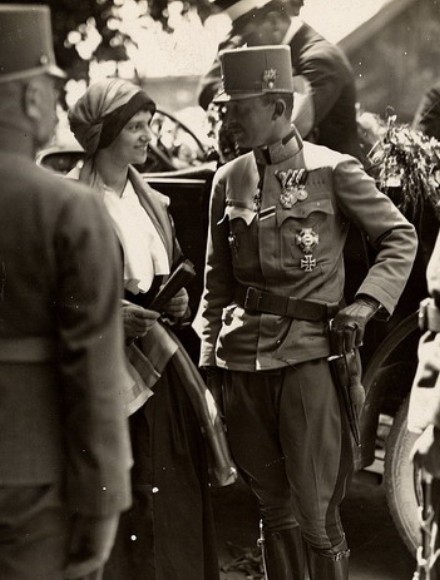General
About Andrew Cusack
 Writer, web designer, etc.; born in New York; educated in Argentina, Scotland, and South Africa; now based in London.
Writer, web designer, etc.; born in New York; educated in Argentina, Scotland, and South Africa; now based in London. read more
News
Blogs
Reviews & Periodicals
Arts & Design
World
France
Mitteleuropa
Knickerbockers
Argentina
The Levant
Africa
Cape of Good Hope
Netherlands
Scandinavia
Québec
India
Muscovy
Germany
Academica
The End of Canada Dry?

AH, GINGER ALE, one of the finer things in life if you ask me, and of course the finest ginger ale of all is good old Canada Dry. I was disturbed therefore when I recently saw a bottle of the “champagne of ginger ales” defaced with the name of Schweppes. (Schweppes ginger ale is tangier and much less enjoyable than Canada Dry). It turns out that the Cadbury Schweppes corporation now owns Canada Dry, which would not necessarily be a bad thing were it for the fact that I immediately suspected the ginger ale was Schweppes but the packaging was Canada Dry.
This would be a true abomination, the equivalent of selling some modern “pop art” and advertising it as the work of an old master. At the time I believed it actually was Schweppes, but my tastebuds having returned as my illness retreated, I’m not quite sure anymore. If the Cadbury Schweppes corporation has destroyed our favourite ginger ale, then let them be anathema!
Spring Vac
Posting over the next fortnight will be light or even non-existant, as next week I am going on pilgrimage to Rome, and the following week I will be spending down in Somerset. Until I return, enjoy the above post on recent Floridian architecture, and remember there are category archives above for you to peruse if you get bored and need a dash of Cusack.
Housekeeping: An Update
I do hope you will pardon our appearance while we’re fixing everything up. In the process of reconstruction, it seems a few things have been misplaced and I’m afraid it may be some time before they are put to rights (though naturally, we have every intention of putting them to rights).
It would seem that, due to our own faults, previous posts must be reentered and reposted, but this process has already commenced. You will note many of the posts under the ‘Recommended’ section on the right are already up and running again, and once those are complete, my Maces of America series (published, in part, in the Quarterly Journal of the Guild of Mace-Bearers, I should remind you) will be next after that. From thence I suspect I will procede backwards chronologically in reuploading our content. (Just reposted Rob and Maria’s wedding).
Nonetheless, in addition to bringing back the old stuff, we will indeed provide you with new amusements and observations, and tales of every shape and hue.
Euthanasia Revisited
In Praise of Hatred
The young Miss Burbage points me to this article in the Crimson on the virtues of hatred, with the comment “I thought as much”. I have observed that some of the most amusing people I know are “haters”. One of the great drawbacks of our politically-correct age is that the most drole and entertaining stories I hear cannot be shared on this webpage for the participants’ fear of prospective employers googling their names and coming up with surly tales of various hijinks.
It’s all in good fun, of course, but some people will just never get it. I’m particularly reminded of an Allison Burbage story which took place at a party in the town of Pelham, which certianly cannot be retold here and now. Nonetheless, just remembering Burbage’s delivery of this story sends me into barrels of laughter.
Someday, I hope to unite all the haters in my life (Miss Burbage, Mr. Ishmael, Mr. Burke, as well as all the closet haters — you know who you are) in one giant transatlantic dinner party where we can verbally savage and profane all the sacred cows of our terrible modern world. It would be a night to remember. Vive le vitriol!
Reading Roundup

Lexington, the column in the Economist, writes about the lack of diversity in American higher education in a piece entitled “America’s one-party state”.
The Telegraph notes that more and more Dutch people are leaving their native land, with emigration surpassing immigration in the Netherlands. (Registration might be required to view article).
John Lukacs depicts the rise and fall of the ‘liberal’ in America in “The Triumph and Collapse of Liberalism” printed in the Chronicle of Higher Education.
Eugenics and America
This review of Edwin Black’s new book War Against the Weak: Eugenics and America’s Campaign to Create a Master Race deserves your attention.
The Holy Whapping — Ad Multos Annos

A hearty congratulations to the Brother and Sister Servants of the Holy Whapping who day and night maintain their sacred vigil at the Shrine of the Holy Whapping. The Shrine has reached its approximate first anniversary, and has dispensed much jolliness from its verdant e-pages.
It is to them, that I dedicate the above image of the Blessed Pier Giorgio Frassati, with his group of Catholic practical jokers “i Sinistri” – the Sinister Ones. Pier Giorgio, more than any other saint or holy person, deserves to be patron of the Shrine of the Holy Whapping for his unrelenting commitment to first holiness and second humour. If you don’t know about Pier Giorgio, then read the biography written by his sister.
And you can never have too much of the Emperor Charles and Empress Zita!

Who’s still afraid of Keith Windschuttle?
Published in

By Ean Higgins
July 22, 2004
AS the elite of the nation’s academic historians met in the stately rooms of the Newcastle Town Hall, fear and loathing lurked the corridors.
The Australian Historical Association spent virtually an entire day trying to work out strategies to deal with the menace. Would there be safety in numbers if academics stood together? What should be done when the terror struck again? How could anyone survive when the mass media was in on the conspiracy?
Over 18 months after Keith Windschuttle published his book The Fabrication of Aboriginal History, the academic world is still anguishing over its impact. It is terrified of what he will do next. Windschuttle struck at the heart of the accepted view of Australian colonial history in the past 30 years – that the settler society had engaged in a pattern of conquest, dispossession and killing of the indigenous inhabitants. The facts, he said, did not stack up.
The Sydney-based writer, among other things, questioned the references used by academic historian Lyndall Ryan to justify her claims that the British massacred large numbers of Aborigines in Van Diemen’s Land in the early 1800s. Her footnotes supporting the claims did not do so, he wrote.
He also took on Henry Reynolds, the venerable historian of the Left, whose depiction of a brutal British conquest of Tasmania had been the accepted norm.
Reynolds’s work on the concept of terra nullius — that the British seized Aboriginal land based on a policy that it was owned by no one — developed such currency that it is believed to have influenced critical High Court judgments on land rights, including the Mabo decision. The thrust of Windschuttle’s thesis was that political correctness had triumphed over historical fact.
With the passage of time, the academic history profession is far from over the history wars. An extraordinary number in its ranks believe they have been been damaged by populist history propounded by Windschuttle. They are searching for a way out. Only a few seem brave enough to speak up, arguing that freedom of expression is the primary issue.
At the recent conference, Ryan made some effort, though ultimately unsuccessful, to avoid media coverage for a talk she gave entitled How the Print Media Marketed Keith Windschuttle’s The Fabrication of Aboriginal History: Implications for Academic Historians.
She said the media had taken up Windschuttle as representing the real history of colonists’ relations with Aborigines, grabbing the view that Australians had been hoodwinked by the academic left-wing historians’ version. “I don’t think the media owns free speech,” Ryan said. She had also been shocked, she said, that Stuart Macintyre, the influential left-leaning University of Melbourne historian, had appeared to criticise her over footnote inaccuracies.
She did admit to five footnote errors, but said the primary sources verified her thesis and “the simple fact is that footnote errors do occur”.
Her abstract said: “The AHA and universities need strategies and protocols in place to address future assaults on academic historians.”
Ryan was not alone in promoting the Windschuttle-media conspiracy. The AHA president, David Carment, said the The Australian had deliberately timed the publication of its review of Windschuttle’s work for the summer of 2002. During holidays more academics were on leave, Carment said, and “less able to defend themselves,” and it was “a time when people were reading newspapers”. (In fact, newspaper circulations fall away over summer holidays.)
It might be time, Carment said, for the association to “defend its people on the basis of their professional integrity” while not taking sides in the debate.
Carment also raised, though he did not fully support, the concept put forward by West Australian historian Cathie Clement for a code of ethics that would gag historians from criticising the integrity of their peers in public. Several in the audience said everyone had to be ready to counter-attack when Windschuttle came out with his next book.
Richard Waterhouse from the University of Sydney, said academics took Windschuttle too seriously. “Sometimes we have tended to treat him as an intellectual equal,” Waterhouse said, adding that sarcasm might be more appropriate. (Windschuttle earned a first-class honours degree in history from the University of Sydney in the 1960s, lectured in the subject, earned a masters in politics and left Macquarie University in 1992 when he set up a publishing house.)
There were a couple of muted mutterings from the audience about how it would be necessary to learn media skills, and not attempt to look like academics defending their own cabal. But nobody at the session publicly asked the key question which was in some of their minds: was the academic historians’ fear of Windschuttle and newspaper opinion pages absolutely paranoid?
Greg Melleuish, from the University of Wollongong, says he is intimidated by the pack mentality of the Newcastle meeting. “I was quite astonished,” he says. “It was like ‘let’s get a group of people together to ambush Windschuttle’. I think they feel under threat and that’s why they concoct these conspiracy theories.”
Other historians have expressed alarm at the attitude of their peers, including classical studies historian Ronald Ridley at the University of Melbourne. “The way they have shut down the debate, if they have made some errors, is really appalling,” he says.
“I don’t think any historians of Greek or Roman history would make these mistakes. And when you deal with issues such as indigenous history, the politics are red hot. You don’t just have to be a competent historian, you have to be top class.”
The question is why academic historians are so concerned about the impact of Windschuttle.
Macintyre, while he does not accept Windschuttle’s suggestion of a fabrication, does warn that mistakes can have a broader effect.
“There is an understandable public concern about the accuracy of historians’ work,” he says. At the same time, Macintyre maintains, Windschuttle fits with a conservative agenda to lift a burden of national shame from Australian shoulders over the Aboriginal issue.
Macintyre told the conference the history wars fitted in with broader “political dimensions” of the Howard Government’s “abandonment of reconciliation, denial of the stolen generations, its retreat from multiculturalism and creation of a refugee crisis”.
“Windschuttle was the first conservative intellectual to base his case on substantial historical research,” he says.
Windschuttle says this is precisely why the academic community is still so scared of him. “There is a whole generation who have invested not just their academic capital but also their political capital in the Henry Reynolds view,” he says. And, says Windschuttle, he has made Australian history interesting again for high school students who are more likely to go on to study it in universities.
While not referring to the Windschuttle debate, NSW Premier Bob Carr, a longstanding history buff, said much the same thing at the conference.
“History is an argument and the more argument there is in it the more young people will read it,” he said.
In the Attic
I bought a copy of France-Amerique, the international edition of Le Figaro, tonight and decided that I needed to brush up on la belle langue. I trekked up to the attic to find my old French textbook, and stumbled upon an indulgence granted by the Blessed Pope Pius XII and an Apostolic Blessing from Pope Paul VI. How random! Nonetheless, I must get on with France-Amerique.
You never know who you’ll run into in Alphabet City…
Whilst sipping a pint of de Koninck at about 1:00am in Croxley’s Beer Garden down on Avenue B in Manhattan, who did I run into but La Tuna de Derecho de Barçelona!!! Thorntonians will remember them as the group of law students from Barcelona that provided us with an evening of song and sangria in the Library way back in the fall of 2000. The funny costume, the guitars, the lively Catalonian folk tunes, it’s all apparently part of the academic tradition of the universities over in Spain.
Anyhow, it was quite interesting talking to a drunken Spaniard in a perhaps seventeenth-century academic costume at such an hour. I’m pretty sure I managed to use all my nifty Spanish phrases, e.g. “Dondé esta la biblioteca?”, “Me gusto los crustaceos”, and “Mis pantalones estan en fuego.”
Search
Instagram: @andcusack
Click here for my Instagram photos.Most Recent Posts
- Teutonic Takeover March 10, 2025
- Katalin Bánffy-Jelen, R.I.P. March 3, 2025
- Substack Cusackiensis March 3, 2025
- In the Courts of the Lord February 13, 2025
- American Exuberant February 10, 2025
Most Recent Comments
Book Wishlist
Monthly Archives
Categories


